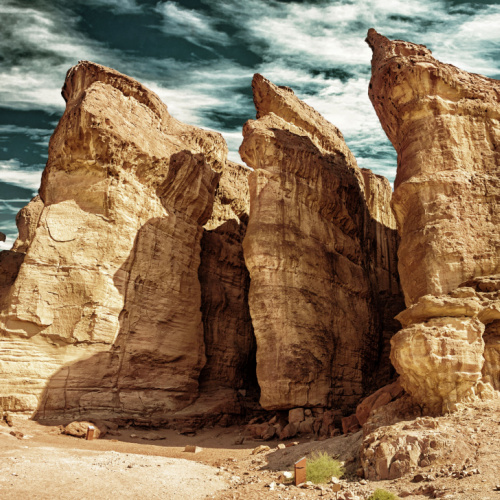
andras_csontos/Shutterstock
When Is the Best Time to Visit Israel?
The best time to visit Israel is during the shoulder seasons of spring and fall. These months offer a perfect balance of favorable weather, fewer crowds, and reasonable prices.
Here’s why these seasons are ideal for your Israeli adventure:
- Mild Weather: Israel experiences a Mediterranean climate, characterized by hot, dry summers and mild, wet winters. During the spring and fall, temperatures are generally mild and pleasant, creating an optimal environment for exploring historical sites, engaging in outdoor activities, and enjoying the diverse landscapes.
- Smaller Crowds: One of the significant advantages of visiting during the shoulder seasons is the reduction in tourist crowds. Popular attractions such as Jerusalem’s Old City, the Dead Sea, and the ancient ruins of Masada are more accessible, allowing for a more intimate and immersive experience.
- Lower Prices: Traveling during the shoulder seasons often means lower prices for flights, accommodations, and activities compared to the peak summer season. This allows you to maximize your budget without compromising on the quality of your experience.
Here are some specific examples of how you can enjoy the most of Israel during the shoulder seasons:
- Spring: Take advantage of the mild and sunny weather in spring by exploring iconic sites like the Old City of Jerusalem, touring the vibrant markets of Tel Aviv, and hiking in the picturesque landscapes of the Golan Heights.
- Fall: Embrace the mild and sunny days of fall by visiting the historical sites of Bethlehem and Nazareth, enjoying the beaches of Tel Aviv, and embarking on a culinary journey through the diverse flavors of Israeli cuisine.
While Israel is a captivating destination year-round, the shoulder seasons of spring and fall stand out as the optimal times for a visit. With mild weather, fewer crowds, and lower prices, you can fully immerse yourself in the rich history, diverse culture, and stunning landscapes that Israel has to offer.
 Average Temperatures by Month
Average Temperatures by Month
|
Jan |
Feb |
Mar |
Apr |
May |
Jun |
Jul |
Aug |
Sep |
Oct |
Nov |
Dec |
| Fahrenheit |
49°
|
51°
|
56°
|
64°
|
72°
|
77°
|
80°
|
81°
|
79°
|
71°
|
62°
|
53°
|
| Celsius |
9°
|
11°
|
13°
|
18°
|
22°
|
25°
|
27°
|
27°
|
26°
|
22°
|
17°
|
12°
|
Climate in Israel
Summer Season in Israel
Israeli summers are hot and dry, particularly in the southern and eastern desert regions. Coastal areas like Tel Aviv experience milder temperatures but with high humidity. This season is characterized by intense heat and clear, sunny skies, making it ideal for beach activities along the Mediterranean coast. Inland and in the south, the temperatures are much higher, often requiring precautions against the extreme heat.
Rainy Season in Israel
The rainy season in Israel brings most of the country's annual rainfall, primarily in the northern and coastal regions. Rainfall is crucial for replenishing water sources and agriculture. The rain usually comes in the form of intense showers, interspersed with sunny days. In desert areas, rainfall is less frequent and more unpredictable.
Winter Season in Israel
Winters in Israel are mild and wet in the coastal areas, with cooler temperatures and regular rainfall. Inland and in the southern desert regions, winters are milder and drier. Snowfall is rare but can occur in the northern highlands and Jerusalem. The winter season is characterized by shorter days and is a good time for exploring cultural and historical sites, as the weather is more comfortable compared to the hot summer months.
Our Recommendations
| Destination |
Jan |
Feb |
Mar |
Apr |
May |
Jun |
Jul |
Aug |
Sep |
Oct |
Nov |
Dec |
| Israel |
 |
 |
 |
 |
 |
 |
 |
 |
 |
 |
 |
 |






